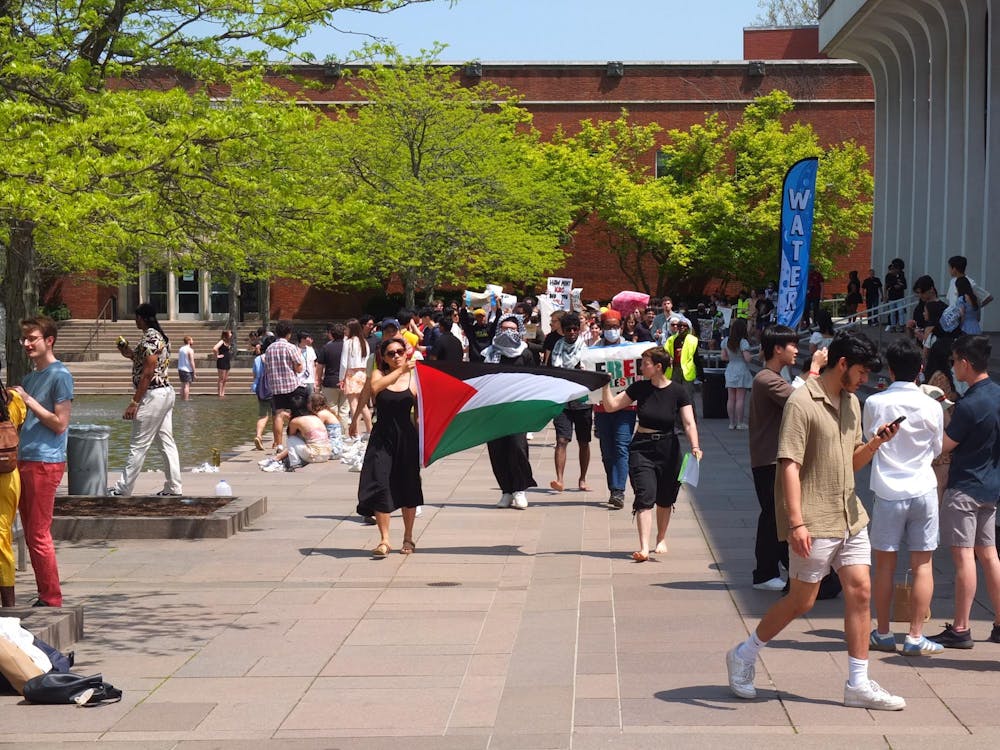In the Opinion piece written by President Christopher Eisgruber ’83 last week, Eisgruber articulated Princeton University’s restrictions on speech and emphasized Princeton’s right to “reasonably regulate the time, place, and manner of expression to ensure that it does not disrupt the ordinary activities of the University.” As a matter of law and administrative policy, President Eisgruber is correct. But restrictions on “disruption” to “ordinary activities” inherently suppresses the underlying intent of creating disruption of many protests that express progressive political views. This includes the University’s recent action taken against Princeton students’ sit-ins and protests on behalf of Gazans, victims of a military campaign — plausibly deemed genocidal — currently being waged by Israeli military forces. Not only do current regulations on “disruption” effectively prohibit impactful expression about progressive concerns, but — contrary to President Eisgruber’s assertions — these regulations are inherently not “viewpoint-neutral.” In fact, these rules stifle progressive speech, which is often accompanied by “disruptive” action supplementing the relevant propagated verbal and written messages.
Students have already highlighted this critical point far before these protests; instigating radical change in both policy and public perceptions sometimes necessitates, and is historically tied to, disruptive and uncomfortable action. Providing a historical parallel to today’s “Gaza Solidarity Encampment,” we can look to Princeton’s very own protests demanding divestment from corporations involved with South African apartheid in the 1980s. Despite institutional resistance to their actions, history has vindicated those student protestors. With this in mind, Princeton must specifically change the administrative standard from restricting actions that constitute a “disruption” to those that constitute a “danger” to campus dialogue or students. Doing so would protect the intrinsically disruptive nature of much politically progressive expression and better foster the free exchange of ideas Princeton purports to cultivate on its campus. Only then would the University be able to claim that the administration’s freedom of expression policies are “viewpoint-neutral.”
As a start, the University must recognize that content and mode of expression work together to deliver a message during protests, especially for politically progressive messages demanding transformational changes to established practices. When Princeton administrators suppress mere disruptions tied to progressive speech, they effectively suppress a substantial portion of the speech itself. For example, since last Thursday, Princeton students protesting Israel’s military campaign against Gazans have established an “encampment” as an act of solidarity with Palestinian justice organizations’ encampments at higher education institutions across the United States.
Here, the main message of the sit-in — advocating for a ceasefire in Gaza and for Princeton to disclose and divest from companies profiting from Israel’s military campaign — is linked to and amplified by the action of maintaining a space for peaceful pro-Palestinian activism, especially as other university administrators crack down on mostly nonviolent pro-Palestinian protests around the country. Part of the point of protesting is to raise awareness on issues where protesters suspect apathy. Instigating disruption that inconveniences figures in power — in the case of the Gaza sit-in, University administrators — forces these groups to confront the issues being discussed.
Importantly, accommodating “disruption” is a viewpoint-neutral policy, even if mostly applicable to politically progressive demonstrations. Protesters across the ideological spectrum should be able to engage in disruptive activity that does not endanger or harass others. As currently constructed, however, the University’s “disruption” standard disproportionately restricts progressive activism on Princeton’s campus. Both to sufficiently protect progressive political expression — making Princeton’s policies truly viewpoint-neutral — and to open the doors for more activism across the political spectrum, University administrators should only stop protests that endanger others.
Making “danger” the new standard for administrative intervention in student action both provides students with greater leeway to express their views and reduces the possibility of differential treatment of speech, depending on the topic. As the Daily Princetonian Editorial Board wrote just a few days ago, the 2015 Black Justice League and 2019 Princeton Students for Title IX Reform sit-ins — in which involved students, despite peaceful and disruptive protest, were not subject to disciplinary action — were treated very differently from the ongoing sit-in for Palestine. The University’s choice to attempt to regulate speech on the Israel-Palestine conflict reflects the urgency of permanently altering Princeton’s policies on free expression. Shifting the standard for University intervention from one of “disruption” to one of “danger” would more closely align with administrative precedent on engagement with particularly disruptive protests.
Preventing violence, threats, and harassment at Princeton should obviously remain an administrative priority. In the context of Princeton’s Gaza sit-in, students and the administration can — and I believe must — discuss whether particular slogans constitute harassment against Jewish students. Short of that, however, regulating protests solely because of “time, place and manner” effectively places University administrators’ convenience above the important messages that students and faculty wish to disseminate. Alongside safety concerns, which the Editorial Board has already debunked in full, President Eisgruber has admitted as much. In his editorial, he cites “obstruct[ion]” and the need for “significant staff time” to justify limitations on encampments and occupations. But by restricting even disruptive speech on the grounds of so-called logistical inconveniences, the University fails to fulfill its mission of creating the conditions for the exchange of ideas.
With Princeton graduate students arrested solely for setting up tents, and now with others facing disciplinary action merely for conducting a sit-in, all students should be alarmed by Princeton’s policies on free expression. New policies are needed to accommodate the realities of progressive political protest — reflecting an understanding that content and modes of expression are both important — and create true “viewpoint-neutral” free expression policies. Across the political and ideological spectrum, we must call for an amended policy, both in writing and in enforcement, to effectively protect the free exchange of ideas cherished by students, faculty and the administration alike.

Rishi Khanna is a senior in the politics department and a contributing columnist for the ‘Prince’ from Newton, Mass. He can be reached at rskhanna[at]princeton.edu.









